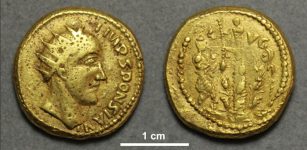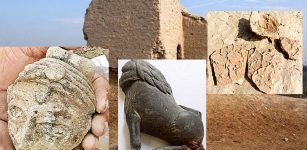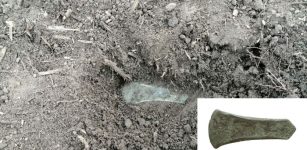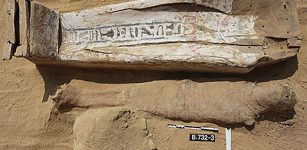Caesar’s Invasion Of Britain Started from Pegwell Bay in Kent – New Study Says
AncientPages.com - Archaeologists from the University of Leicester suggest that the first landing of Julius Caesar’s fleet in Britain took place in 54 BC at Pegwell Bay on the Isle of Thanet, the north—east point of Kent.
Researchers have found a defensive, about 16 feet wide ditch at Ebbsfleet (a small hamlet in Thanet), which resembles first-century BC Roman defenses uncovered at Alesia, in France, where the decisive battle in the Gallic War took place in 52 BC.

Caesar's invasions of Britain Part of Caesar's Gallic Wars. Edward Armitage's reconstruction of the first invasion. Image: wikipedia
“The site at Ebbsfleet lies on a peninsula that projects from the south-eastern tip of the Isle of Thanet,” said Dr Andrew Fitzpatrick, Research Associate from the University of Leicester’s School of Archaeology and Ancient History
“Thanet has never been considered as a possible landing site before because it was separated from the mainland until the Middle Ages.
“However, it is not known how big the Channel that separated it from the mainland (the Wantsum Channel) was.
“The Wantsum Channel was clearly not a significant barrier to people of Thanet during the Iron Age and it certainly would not have been a major challenge to the engineering capabilities of the Roman army.”
The researchers also unearthed iron weapons, including a Roman javelin, and human bones bearing injuries. The site, located near the open sandy shore of Pegwell Bay, probably included a fort and served to protect Caesar’s 800 Roman ships.
The location that matches Caesar's own account of his landing in 54 BC, was most probably chosen due to its visibility from the sea, the existence of a large open bay, and the presence of higher ground nearby.
Additionally, researchers say that the size (up to 20 hectares), shape, date of the defenses at Ebbsfleet and the presence of iron weapons including a Roman pilum (javelin) all suggest that the site at Ebbsfleet was once a Roman base of 1st century BC date.
“This was the beginning of the permanent Roman occupation of Britain, which included Wales and some of Scotland, and lasted for almost 400 years, suggesting that Claudius later exploited Caesar's legacy,” according to Prof. Colin Haselgrove, the principal investigator for the project.
AncientPages.com
Expand for references





















